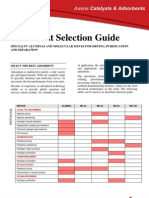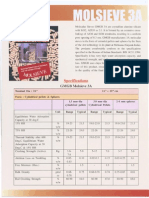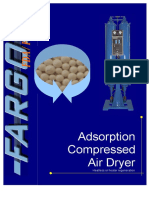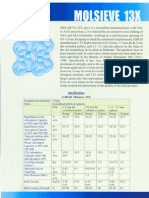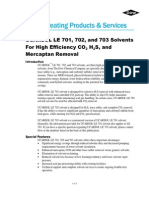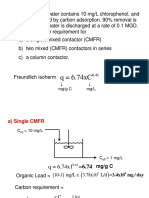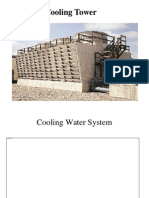Static and Dynamic Adsorption Capacity: September 2010
Uploaded by
Nagwa MansyStatic and Dynamic Adsorption Capacity: September 2010
Uploaded by
Nagwa MansySeptember 2010
STATIC AND DYNAMIC ADSORPTION CAPACITY
olecular Sieves data sheets usually mention the adsorption capacity of water at a certain water concentration, partial pressure or relative humidity and a certain temperature. This value is obtained by leaving the adsorbent during several days under controlled conditions and measuring its weight increase. The value obtained is the STATIC adsorption capacity. The water adsorbed on the sieves is in equilibrium with the water partial pressure (concentration) in the gas phase. For 4A sieves these values are in the range of 22-23% at 25C (77F) and 11.88 mmHg (0.23 psi) water partial pressure.
Other values for the STATIC adsorption capacity can be obtained by isotherms. See above diagram shows the isotherm for water on a 4A molecular sieve. In industrial molecular sieve units the DYNAMIC (or OVERALL ADSORPTION) capacity is more important. Its value can be calculated by taking the amount of water adsorbed on an adsorbent bed and by dividing it by the quantity (mass) of the adsorbent bed. Its value is different for every unit as it depends on the design. Why is there a difference between STATIC and DYNAMIC adsorption capacity? The DYNAMIC adsorption capacity takes into account that only a part of the bed, the equilibrium zone (EZ) is saturated. Another part, the mass transfer zone (MTZ), where the gas is dried to the specifications, is only partially saturated. There might be a third part of fresh sieve, entirely unsaturated, if the unit works with a fixed adsorption time. This part will serve for drying once the EZ and MTZ are aged and have lost in adsorption capacity. Typical values for a DYNAMIC adsorption capacity for gas drying would be in the range of 11-13%. For liquid drying about 10-12%. If you wish to know more about vessel loading preparation, be sure to read the next issue of the On-Spec Newsletter
Adsorption solution provider for drying and purification of gases or liquids Contact us for your process optimization our specialists at your service www.siliporite.com, siliporite@ceca.fr
You might also like
- Molecular Sieves: + Activated Alumina Adsorbents100% (1)Molecular Sieves: + Activated Alumina Adsorbents4 pages
- Hydrothermal Damaging of Molecular Sieve and How To Prevent It100% (1)Hydrothermal Damaging of Molecular Sieve and How To Prevent It12 pages
- Tutorial On Visual Minteq 2.30 AdsorptionNo ratings yetTutorial On Visual Minteq 2.30 Adsorption26 pages
- Design and Control of Distillation Systems for Separating AzeotropesFrom EverandDesign and Control of Distillation Systems for Separating AzeotropesNo ratings yet
- Molecular Sieve Desiccant Dehydrator For Natural Gas: Bettis Model DD (Standard Service) Bettis Model DD-S (Sour Service)No ratings yetMolecular Sieve Desiccant Dehydrator For Natural Gas: Bettis Model DD (Standard Service) Bettis Model DD-S (Sour Service)4 pages
- FLEXICHEVRON-Mist-Eliminators Type VIIINo ratings yetFLEXICHEVRON-Mist-Eliminators Type VIII12 pages
- UnderstandingCatalystsOperation H2plantcomplete Nov2015No ratings yetUnderstandingCatalystsOperation H2plantcomplete Nov2015141 pages
- UOP Horizontal Adsorber Unloading Loading SOP100% (1)UOP Horizontal Adsorber Unloading Loading SOP17 pages
- Orbit Article Molecular Sieve Dehydration Switching Valves0% (1)Orbit Article Molecular Sieve Dehydration Switching Valves12 pages
- BASF 13X Molecular Sieve: Product Data Sheet0% (1)BASF 13X Molecular Sieve: Product Data Sheet3 pages
- Sasol Germany GMBH: Pural®/Catapal® High Purity AluminasNo ratings yetSasol Germany GMBH: Pural®/Catapal® High Purity Aluminas9 pages
- A Complete Range of Solutions For Sulfur Recovery: Christian STREICHER, ProsernatNo ratings yetA Complete Range of Solutions For Sulfur Recovery: Christian STREICHER, Prosernat28 pages
- A Simulation Study of Performance Evaluation of Single-Stage Absorption PDFNo ratings yetA Simulation Study of Performance Evaluation of Single-Stage Absorption PDF10 pages
- Benefits of Standby Time in Adsorption Dehydration ProcessNo ratings yetBenefits of Standby Time in Adsorption Dehydration Process10 pages
- Uop Molecular Sieves : Screen Size Opening (MM)No ratings yetUop Molecular Sieves : Screen Size Opening (MM)7 pages
- Haldia Petrochemicals Ltd. Technology Training Course Process OverviewNo ratings yetHaldia Petrochemicals Ltd. Technology Training Course Process Overview55 pages
- Proper Regeneration of Molecular Sieves in TSA Processes-Part 1100% (1)Proper Regeneration of Molecular Sieves in TSA Processes-Part 17 pages
- Air and Gas Drying With Axsorb Activated Alumina-English100% (1)Air and Gas Drying With Axsorb Activated Alumina-English11 pages
- Attachment No.2 CECA Technical Proposal Unit 104ANo ratings yetAttachment No.2 CECA Technical Proposal Unit 104A2 pages
- Optimization and Selection of Reforming Approaches For SyngasNo ratings yetOptimization and Selection of Reforming Approaches For Syngas15 pages
- Cryogenic Air Separation Unit, Oxy-CombustionNo ratings yetCryogenic Air Separation Unit, Oxy-Combustion15 pages
- KIRK KSME Axial Cyclone Swirl Mist Eliminators PDFNo ratings yetKIRK KSME Axial Cyclone Swirl Mist Eliminators PDF4 pages
- Gas Dehydration Process by Using TEG and Silica Gel100% (1)Gas Dehydration Process by Using TEG and Silica Gel29 pages
- Thermochemical Conversion of Biomass for the Production of Energy and ChemicalsFrom EverandThermochemical Conversion of Biomass for the Production of Energy and ChemicalsNo ratings yet












